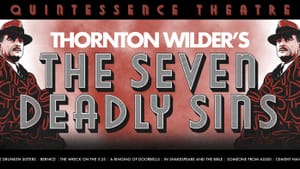Stay in the Loop
BSR publishes on a weekly schedule, with an email newsletter every Wednesday and Thursday morning. There’s no paywall, and subscribing is always free.
The wonders of late Wilder
Quintessence presents Thornton Wilder’s ‘The Seven Deadly Sins’

Thornton Wilder is best known for Our Town, but his lesser-known work gets much, much weirder than this evergreen American classic. Later this month, Quintessence Theatre group produces his peculiar millennia-spanning epic The Skin of Our Teeth. To whet the appetite for this 1943 Pulitzer-winner, Quintessence has enlisted local and national talent for an audio production of another rarely produced Wilder work, The Seven Deadly Sins.
Ambition and humanism
Beginning in the late 1950s, Wilder wrote a one-act for each sin. By his death, only four had been produced, and two were taken out of circulation. It wasn’t until the centenary of his birth in 1997 that his estate completed, published, and produced the complete cycle, and the works weren’t presented in one bill until November 2019.
Despite the cycle’s scant theatrical history, they are a surprising delight and a wonderful exploration of Wilder’s late writing. Ranging in styles and settings, these short plays (from 20 to 40 minutes long) remind us of the playwright’s dramatic ambition and humanistic philosophical stance. To explore our proclivity for vice, Wilder takes us into the homes of the immortal, the wealthy, the middle-class, and the destitute. Here, Michael Brusasco as Thornton Wilder provides a welcome host to the affair, and some helpful context.
Laughs, thrills, and twists
The Drunken Sisters (Gluttony) and Someone from Assisi (Lust) are the only two plays that take place outside of 20th-century America. The titular drunken sisters (played by Hanna Gaffney, Leigha Kato, and Marcia Saunders) are the three fates of Greek mythology. However, Wilder uses his classical setting to a delightful effect to write a light and funny play. In contrast, Someone from Assisi presents the religious figures of Saint Francis (Steven Wright) and Saint Clara (Kato) to illustrate the destructive and creative potential of human desire. Unlike the straightforward storytelling of Sisters, Someone from Assisi hops time and memory to complicate the story of the sainted monk.
Bernice (Pride) and In Shakespeare and the Bible (Wrath) offer tense theatrical thrillers in stately American homes around the turn of the 20th century. Inspired loosely by the Ben Hecht novel Miracle in the Rain, Bernice depicts a returned convict who must attempt to settle back into his daily life. In Shakespeare and the Bible, inspired by Henry James, a young woman (Kato) realizes she needs to know more than what she can learn about in books. In both, the pretenses of high society lead into a dark underbelly of murder and prostitution. However, rather than cast judgement on the sins, Wilder seems to lay them bare in a gentle, honest way. The sinners are painted no less honorably than those who clutch their pearls: the sin seems to be less of a problem than the denial that surrounds it.
My favorite works of the cycle, The Wreck on the 5:25 (Sloth), A Ringing of Doorbells (Envy), and Cement Hands (Avarice) offer wry, comedic observations on money, status, gender, and family. In each, a delightful twist subverts expectations.
An audio success
Many of the plays are well-served by their audio play format. Sound designer Daniel Kontz keeps things clean and effective, providing a real gift of a record of these works. The plays often take place over the course of a single conversation and the audio format keeps the listener engaged in the story. There are some moments where it seems that some onstage action is taking place. We are left to wonder what is happening, as no one reads stage directions. This evokes the incompleteness of the Wilder plays—several of them were compiled posthumously.
This performance of the cycle, a fundraiser for Quintessence, is available to stream through the Quintessence website. They can be enjoyed in the dark, on the road, or over a glass of wine. I thoroughly enjoyed listening to them on a long weekend drive.
Image description: A promo image for Quintessence’s The Seven Deadly Sins. On either side of the central title, there’s an identical man, wearing a hat and a coat that has the sins written on it in red.
What, When, Where
The Seven Deadly Sins play cycle. By Thornton Wilder, directed by Paul Hebron (The Drunken Sisters and Someone from Assisi); Stephen A. Wright (Bernice and Cement Hands); Mattie Hawkinson (A Ringing of Doorbells and In Shakespeare and the Bible); and Lee Cortopassi (Wreck on the 5:25). Drunken Sisters, Bernice, The Wreck on the 5:25, and A Ringing of Doorbells were available June 10-13, 2021; In Shakespeare and the Bible, Someone from Assisi, and Cement Hands are available June 17-20, 2021. They’re available to stream online via the Quintessence website with a suggested donation of $35.
Sign up for our newsletter
All of the week's new articles, all in one place. Sign up for the free weekly BSR newsletters, and don't miss a conversation.

 Josh Herren
Josh Herren